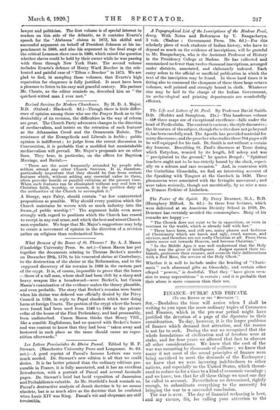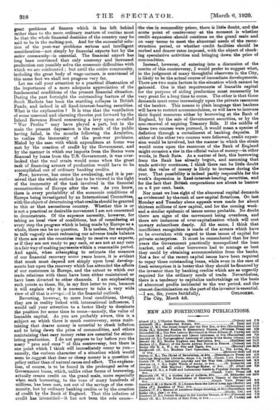FINANCE—PUBLIC AND PRIVATE.
[To THE EDITOR OP THE " SPECTITOR."] SIR,—Doubtless the time will arrive when I shall be writing to you upon the more ordinary topics of Commerce and Finance, which in the pre-war period might have justified the devotion of a page of the Spectator to their consideration. To-day, however, it is the larger problems of finance which demand first attention, and the reason is not far to seek. During the war we recognized that the whole foundations of civilization and of freedom were at stake, and for four years we allowed that fact to obscure all other considerations. We knew that the cost of the war was mounting by thousands of millions ; we knew that many if not most of the sound principles of finance were being sacrificed to meet the demands of the Exchequer ; we knew that we were incurring indebtedness to other nations, and especially to the United States, which threat- ened to reduce us for a time to a kind of economic vassalage ; and we knew, too, that for all these things we must one day be called to account. Nevertheless we determined, rightly enough, to subordinate everything to the necessity for bringing the war to a successful conclusion. The war is over. The day of financial reckoning is here, and my excuse, Sir, for calling your attention to the great problems of finance which it has left behind rather than to the more ordinary matters of routine must be that the whole financial destinies of the country may be said to be in the melting-pot. And for the successful of the post-war problems serious and intelligent consideration—not simply by financial experts but by the entire community—is essential. The financial expert has long been convinced that only economy and increased production can possibly solve the economic difficulties with which we are confronted ; but until the entire community, Including the great body of wage-earners. is convinced of this same fact we shall not progress very far.
Let me call your attention to a practical illustration of the importance of a more adequate appreciation of the fundamental conditions of the present financial situation. During the past fortnight the outstanding feature of the Stock Markets has been the startling collapse in British Funds, and indeed in all fixed-interest-bearing securities.
What is the explanation It is true that the ventilation of some unsound and alarming theories put forward by the Inland Revenue Board concerning a levy upon so-called " War Profits " may have played a part, but in the main the present depression is the result of the public having failed, in the months following the Armistice, to realize the immensity of the post-war problems. Misled by the ease with which expenditure at home was met by the creation of credit by the Government, and by the manner in which our imports from the States were financed by loans from the U.S. Government, it was over- looked that the real strain would oome when the great task of financing arrears of production would have to be accomplished out of ordinary banking credits.
Now, however, has come the awakening, and it is per- ceived that the whole outlook has to be viewed in the light of the immensity of the task involved in the financial reconstruction of Europe after the war. As you know, there is every probability of the economic conditions of Europe being investigated by an International Committee, with the object of determining what credits should be granted to this or that necessitous country. Whether this is or is not a practical or desirable movement I am not concerned to demonstrate. Of the supreme necessity, however, for taking no local view of conditions, but of considering at every step the progress which is being made by Europe as a whole, there can be no question. It is useless, for example, to talk vaguely about redressing our adverse trade balance if there are not the countries ready to receive our exports, or if they are not ready to pay cash, or are not at any rate in a fair way of making payments within a reasonable period. And again, when attempting to estimate the measure of our finanoial recovery some years hence, it is evident that much must depend not simply upon local develop- ments but upon the recovery which has attended the affairs of our customers in Europe, and the extent to which our trade relations with them have been either maintained or have been diverted to other channels. I am emphasizing such points as these, Sir, in my first letter to you, because it will explain why it is necessary to take a very wide view of all that is compri ,ed in the financial outlook.
Reverting, however, to more local conditions, though they are in reality liked with international influences, I would call your attention to a factor likely to dominate the position for some time to come—namely, the value of loanable capital. As you are probably aware, this is a subject on which there is much controversy, some main- taining that dearer money is essential to cheek inflation and to bring down the price of commodities, and others maintaining that easy money rates are essential for stimu- lating production. I do not propose to lay before you the many " pros and cons " of this controversy, but there is one point which I think will immediately occur to you— namely, the curious character of a situation which would seem to suggest that dear or cheap money is a question of policy rather than of natural cause and effect. The explana- tion, of course, is to be found in theprolonged series of Government loans, which, unlike other forms of borrowing, actually create credit on the grand scale, more especially when such borrowing, to the tune of many hundreds of millions, has been met, not out of the savings of the com- munity, but by ordinary banking credits or by the creation of credit by the Bank of England. That this inflation of credit has intensified—it has not been the sole cause— :the rise in commodity prices, there is little doubt, and the acute point of controversy at the moment is whether credit expansion should continue on the grand scale and on easy terms to meet the abnormal needs of the recon- struction period, or whether credit facilities should be curbed and dearer rates imposed, with the object of check- ing speculative activities and bringing down the price of commodities.
Instead, however, of entering into a discussion of the merits of this controversy, I would prefer to suggest what, in the judgment of many thoughtful observers in the City, is likely to be the actual course of immediate developments. There are two main factors in the situation which cannot be gainsaid. One is that requirements of loanable capital for the purpose of aiding production must necessarily be very great for a long time to come. The other is that these demands must come increasingly upon the private resources of the banker. This means in plain language that bankers will have to restrict accommodation, or will have to increase their liquid resources either by borrowing at the Bank of England, by the sale of Government securities, or by the non-renewal of expiring Treasury Bills. if the middle of these two courses were pursued, it would mean a species of deflation through a curtailment of banking deposits. If either of the other two courses were followed, credit expan- sion would be involved, but the manner in which the strain would come upon the resources of the Bank of England might occasion a rise in the official value of money—in other words, in Bank Rate. As a matter of fact, this borrowing from the Bank has already begun, and assuming that trade activity continues, I think there can be little doubt that the value of money is likely to increase during the year. That possibility is indeed partly responsible for the week's depression in fixed-interest-bearing securities, and for the fact that British corporations are about to borrow on a 6 per cent. basis.
Nor must we lose sight of the abnormal capital demands as evidenced by the rush of new capital flotations. On last Monday and Tuesday alone appeals were made for about thirteen millions of new capital, and for the coming week- end a similar epidemic of issues seems probable. No doubt there are signs of the movement being overdone, and there are instances of over-capitalization which will cost unwary subscribers dearly. All the same, I think that insufficient recognition is made of the arrears which have to be overtaken with regard to these issues of capital for private enterprises. It must be remembered that for four years the Government practically monopolized the loan market, and all other borrowers had to manage as best they could by obtaining accommodation from the banks. Not a few of the recent capital issues have been required to repay these outstanding loans, while even in the case of fresh enterprises it is better that they should be financed by the investor than by banking credits which are so urgently required for the ordinary needs of trade. Nevertheless, there is a tendency to capitalize undertakings on the basis of abnormal profits incidental to the war period, and the utmost discrimination on the part of the investor is essential. —I am, Sir, yours faithfully, ONLOOKER. The City, March 4th.











































 Previous page
Previous page